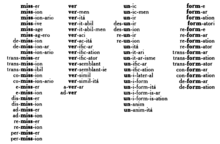Interlingue grammar
The vocabulary is based on pre-existing words from various languages and a derivational system which uses recognized prefixes and suffixes.
The letters of the alphabet are pronounced as a, be, ce, de, e, ef, ge, ha, i, jot, ka, el, em, en, o, pe, qu, er, es, te, u, ve, duplic ve, ix, ypsilon, and zet.
The verb esser (to be) is exceptional in being written es in the present tense, though the esse form is seen in the imperative.
The gerund is used to indicate another action or state of being going on at the same time: scriente un missage, yo videt que... (writing a message, I saw that...).
Some examples:[1][11] Ili vell har esset constructet = They would have been constructed Hante audit to e sin mem regardar li dors del du altres... = Having heard that and without even looking at the backs of the others... (ha + gerund) Other notes on verbs: The subjunctive does not exist in Interlingue: yo vole que tu ama (I want you to love).
[13] Other ways of expressing there is or there are: esser (esset nequó altri a far = there was nothing else to do), exister (it existe du metodes = there are two ways), trovar se (in li cité trova se tri cavalles = there are three horses in the city), etc.
Se makes the verb refer to itself (reflexive form)[1] which often functions as a shorter way to form the passive: li frontieras esset cludet = li frontieras cludet se (the borders were closed).
An obligatory double negative was never imposed and later Occidentalists found that they rarely used it,[15] but it remained permitted and is seen occasionally.
Primary adverbs are not generated from other parts of speech and are thus not formed using any special endings: tre (very), sempre (always), etc.
The ending -men was inspired by Provençal and spoken French (which does not pronounce the t in -ment) and chosen over -mente to avoid clashing with the noun ending -ment and other nouns in the language derived from the past tense in -t.[17][18] Adjectives may be used as adverbs when the sense is clear:[1][19] Il ha bon laborat = He has worked well ("He has worked good") Noi serchat long = We looked for a long time ("We searched long") Dr. F. Haas in 1956 grouped the most common adverbs by type as below.
Many derivatives are formed from the correlatives: qualitá from qual + itá, quantitá from quant + -itá, omnipotent from omni + potent.
[22] The application of de Wahl's rule to verbs, and the usage of numerous suffixes and prefixes, was created to resolve irregularities that had plagued creators of language projects before Occidental, who were forced to make the choice between regularity and unnatural forms, or irregularity and natural forms.
The prevailing view before its application was that natural forms needed to be sacrificed for the sake of regularity, while those that opted for naturalism were forced to admit numerous irregularities when doing so (Idiom Neutral for example had a list of 81 verbs with special radicals[23] used when forming derivatives), a paradox summed up by Louis Couturat in 1903 as follows:[24] In short, one finds oneself confronted by the antinomy that the words that are international are not regular, and the words that are regular are not international; the prevailing opinion [of naturalists such as Julius Lott and de Wahl] was that regularity should be sacrificed for internationality in the formation of words.The rules created by de Wahl to resolve this were first described in 1909[25] in the Discussiones of Peano's Academia pro Interlingua and are as follows: Once these rules were applied, Occidental was left with six exceptions.
They are:[26] Suffixes are added either to the verbal root or the present theme of the verb (the infinitive minus -r).

